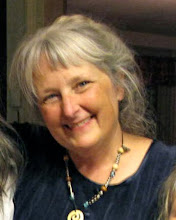High on Wisdom
Here's the text of the Times of India review of The Crazy Wisdom of Ganesh Baba. I think it's the best review I've seen. Thanks, Manu Dev!
High on wisdom
The Crazy Wisdom of Ganesh Baba
By Eve Baumohl Neuhaus
Pages: 160
Price: Rs 295
Wit and wisdom, posture and possibilities, drugs and discourse on the hippie trail — the book on the multi-faceted Shri Mahant Swami Ganeshanand Saraswati Giri, aka Ganesh Baba, has enough to keep the serious seeker as well as those just curious, engrossed. Written by Eve Baumohl Neuhaus, one of Baba's many students, this unusually candid book throws light on the life and times of Baba, who "considered himself the true guru of the psychedelic generation."
By Eve Baumohl Neuhaus
Pages: 160
Price: Rs 295
Wit and wisdom, posture and possibilities, drugs and discourse on the hippie trail — the book on the multi-faceted Shri Mahant Swami Ganeshanand Saraswati Giri, aka Ganesh Baba, has enough to keep the serious seeker as well as those just curious, engrossed. Written by Eve Baumohl Neuhaus, one of Baba's many students, this unusually candid book throws light on the life and times of Baba, who "considered himself the true guru of the psychedelic generation."
Eve's book traces Baba's early days from his initiation by Lahiri Mahasaya to his discipleship with Swami Sivananda and also the period when he ran the Anandamayi Ma ashram. The author also covers the mystic treading the path of Naga Babas, whose affinity to cannabis and other entheogens are well documented. Baba's dos and don'ts for joint sessions are also touched upon, which include the importance of keeping your back straight and controlled, deep breathing while focusing your attention.
Absolute honesty is the trademark of this book. The author pays glowing tributes to her beloved teacher, who is shown to predict that "the psychedelics, rather than the beefy-alcoholics are due to inherit the earth". Then she explains her surprise when she got to know about "his drunken rampages in New York City". Eve writes that even though Baba advocated vegetarianism, he had fish once in a while. She rationalises his behaviour with her arguments that teachers sometimes do have "crazy wisdom" to impart.
Baba's lessons on Crea (for creative) Yoga are given in alliterative 4 P's: posture, pranayama, pinealisation and pronov-mentation or posture (conscious posture and exercise), prana (conscious breathing and eating), practice (conscious action) and presence (constant awareness of consciousness).
The various diagrams and charts for "The Cycle of Synthesis" that depicts the evolution of matter to consciousness and back help the reader appreciate Baba's scientific bent of mind. The book has its origins in Eve's work with Baba in updating his manuscript for a book titled Crea Sadhana.
Ehud Sperling of Inner Traditions, which published Eve's book, gives an account of his days with the "outrageous" yogi in the preface. The picture of the 90-year-old Baba enjoying joints and dancing into the night with naked Brazilian Samba dancers at a New York City party thrown in his honour adds to the esoteric aura of this maverick mystic.
Along with the fun and laughter of Ganesh Baba, the book captures his insistence on what he considers one of the basics of sadhana — keeping the back straight. As Eve says: "If, in the end, you learnt nothing from Ganesh Baba except to keep your back straight, he would be satisfied." That's one thing the reader can implement as a first step and reap benefits, if not the entheogen part.
Labels: crea yoga, Ganesh Baba, India, kriya yoga





